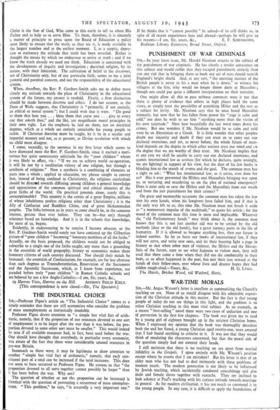PUNISHMENT OF WAR CRIMINALS
Sta,—In your latest issue, Mr. Harold Nicolson returns to the subject of the punishment of war criminals. He has clearly a tender conscience on this subject and would rath'tr that they escaped punishment entirely than run any risk that in bringing them to book any act of ours should tarnish England's bright shield. And, at any rate, " the unerring instinct of the British people is never to hit a man when he is down," as witness his villagers at the fete, who would no longer throw darts at Mussolini ; though one could put quite a different interpretation on their restraint.
One might allow all this to pass without comment were it not that there is plenty of evidence that others in high places hold the same views, or simply treat the possibility of punishing Hitler and the rest as a subject for levity. Mr. Nicolson says that he once hated Mussolini intensely, but now that he has fallen from power his " rage is calm and cold," nor does he wish to see him " anything more than the victim of his own turpitude." Note how beautifully the last word tones down his crimes. But one wonders if Mr. Nicolson would be as calm and cold were he an Abyssinian or a Greek. It is little wonder that other peoples doubt our sincerity and doubt if they can trust us to carry out our declared intentions, and yet, as never before, the whole future of man- kind depends on the degree to which other nations trust our ward and cm the degree that we are worthy of their trust. Mr. Nicolson implies that at any rate we shall be unable to carry out our declared intentions, and quotes international law as written .(for which he declares, quite wrongly, we are fighting) in support of his view, but the dust of his law books is blinding him to the march of events and the goal. The common man has a right to ask: " What has international law, as it exists, ever done for us? Has it ever prevented the Hiders and dussolinis bringing war upon us, or torturing and murdering us on the plea of national emergency? Does it exist only to save the Hitlers and the Mussolinis from our wrath and from the just punishment for their crimes? "
On great and memorable occasions the common man has taken the law into his own hands, when his lawgivers have failed him, and if that is the only way left to us, this time Mr. Nicolson must not brush it aside as " a momentary impulse of the multitude," to quote his article ; for the mood of the common man this time is stern and implacable. Whatever the " old Parliamentary hands " may think about it, the common man knows that this is not just another old war to be settled by the old methods (dear to the old hands), but a great turning point in the life of humanity. If it is allowed to becqme anything less, then our future is indeed sombre. So let us burn our books of international law, if they will not serve, and write new ones, and let their burning light a page in history so that when other men of violence, the Hiders and the Musso- linis of the future, turn to see what happens to violent men, they will read that there came a time when they did not die comfortably in their beds, as so often happened in the past, but met their just reward at the hands of their fellow-men, over whose lives and dearest hopes they had ridden rough-shod.—Yours, &c., H. G. LYALL, The Hazels, Bricket Wood, lid Watford, Herts.


























 Previous page
Previous page